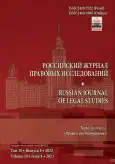Уголовная ответственность за нарушение предписаний регулятивного законодательства
- Авторы: Гузеева О.С.1
-
Учреждения:
- Университет прокуратуры Российской Федерации
- Выпуск: Том 10, № 4 (2023)
- Страницы: 91-104
- Раздел: Уголовно-правовые науки
- URL: https://journal-vniispk.ru/2410-7522/article/view/250050
- DOI: https://doi.org/10.17816/RJLS608177
- ID: 250050
Цитировать
Аннотация
В статье исследуются проблемы конституционной легитимности уголовно-правовых норм с бланкетной диспозицией. Нормы уголовного закона об ответственности за нарушение регулятивных предписаний формулируют состав преступления посредством бланкетного приема его описания, отсылая к нарушению отраслевых или межотраслевых регулятивных норм либо институтов. Конструирование и применение уголовно-правовых норм с бланкетными диспозициями, многократно легитимированное Конституционным Судом РФ, по-прежнему вызывает ряд теоретико-прикладных проблем. Их обсуждение привело к следующим выводам.
Во-первых, в ситуации рассогласования бланкетной диспозиции и бланкетного законодательства надо четко различать случаи истинного отсутствия регулятивных норм от мнимой неопределенности бланкетного уголовного закона. Таковая может иметь место в двух случаях: а) когда закон описывает деяние как «противоправное», при условии, что регулятивное законодательство не знает легальных форм такого поведения (такие нормы не могут рассматриваться в качестве бланкетных); б) когда в регулятивных актах отсутствуют дефиниции понятий, использованных в тексте УК РФ (такая нормативная недостаточность может быть преодолена посредством юридической или специальной технической консультации).
Во-вторых, бланкетная диспозиция может содержать или подразумевать ссылки исключительно на нормативные правовые акты, а не технические нормы и правила, причем на такие положения этих актов, которые включают в себя обязательные, а не рекомендованные предписания. Сами нормативные правовые акты при этом могут занимать различное место в иерархической системе источников права ― от международных договоров до подзаконных актов. В связи с этим отмечается два обстоятельства: а) конституционно допустимая бланкетная ссылка на подзаконные акты не исключает ситуации, при которой подзаконные акты будут противоречить законам и формулировать запреты и ограничения, не предусмотренные ими; в этой связи правоприменитель всегда должен удостовериться, что подзаконное бланкетное содержание нормы является легитимным как с точки зрения содержания, так и с точки зрения формы; б) ссылки в бланкетной части уголовно-правовой нормы на региональные нормативные правовые акты могут считаться конституционно оправданными в той мере, в какой принцип равенства граждан перед законом гарантируется: в материальных составах ― указанием на последствия, которые выступают главным криминообразующим признаком, вне зависимости от вида нарушенных правил, а в формальных составах преступлений ― иерархическим и непротиворечивым характером регулятивного законодательства, принятого по вопросам совместного ведения Федерации и ее субъектов.
Полный текст
Открыть статью на сайте журналаОб авторах
Ольга Сергеевна Гузеева
Университет прокуратуры Российской Федерации
Автор, ответственный за переписку.
Email: Olga3520@list.ru
ORCID iD: 0000-0002-6810-395X
доктор юридических наук, Арбитражный суд Московской области
Россия, МоскваСписок литературы
- Бибик О.Н. Источники уголовного права Российской Федерации. Санкт-Петербург: Юридический Центр Пресс, 2006. 204 с.
- Ображиев К.В. Система формальных (юридических) источников российского уголовного права. Москва: Юрлитинформ, 2015. 504 с.
- Ковалев М.И. Советское уголовное право. Курс лекций. Вып. 2. Советский уголовный закон. Свердловск: Издательство Свердловского юридического института, 1974. 226 с.
- Пикуров Н.И. Квалификация преступлений с бланкетными признаками состава. Москва: Российская академия правосудия, 2009. 288 с.
- Андрианов В.К., Боровиков В.Б., Мотин О.А, Уголовная ответственность за преступления, связанные с нарушением специальных правил. Москва: Российский государственный университет правосудия, 2018. 458 с.
- Волженкин Б.В. Преступления в сфере экономической деятельности по уголовному праву России. Санкт-Петербург: Юридический центр Пресс, 2007. 763 с.
- Климкин В.В. Уголовно-правовая характеристика преступлений, связанных с нарушением правил дорожного движения, и их квалификация: автореф. дис. … канд. юрид. наук. Москва, 2004.
- Федоров А.В. Правовая составляющая определения новых потенциально опасных психоактивных веществ для целей уголовного законодательства и экспертной деятельности // Вестник Университета имени О.Е Кутафина. 2016. № 8. С. 77–88.
- Жевлаков Э.Н. Незаконный оборот новых потенциально опасных психоактивных веществ (комментарий к ст. 234.1 УК РФ) // Вестник Университета имени О.Е. Кутафина. 2015. № 7. С. 101–111.
- Борзенков Г.Н. Преступления против жизни и здоровья: закон и правоприменительная практика. Москва: Зерцало-М, 2008. 256 с.
- Гаухман Л.Д. Квалификация преступлений: закон, теория, практика. Москва: Центр ЮрИнформ, 2005. 448 с.
- Пудовочкин Ю.Е., Пирвагидов С.С. Понятие, принципы и источники уголовного права: сравнительно-правовой анализ законодательства России и стран Содружества Независимых Государств. Санкт-Петербург: Юридический центр Пресс, 2003. 297 с.
- Пикуров Н.И. Уголовное право в системе межотраслевых связей. Волгоград: ВЮИ МВД России, 1998. 221 с.
- Ибрагимов М.А., Ображиев К.В. Нормативные акты иных отраслей права как источники уголовного права. Ставрополь: Сервисшкола, 2005. 96 с.
- Пшипий Р.М. Бланкетная диспозиция уголовно-правовой нормы: доктринальное понимание, законодательные подходы к конструированию и проблемы применения (на примере главы 22 УК РФ): автореф. дис. … канд. юрид. наук. Краснодар, 2015.
Дополнительные файлы







